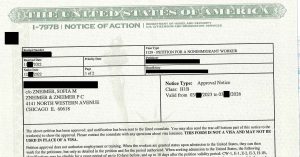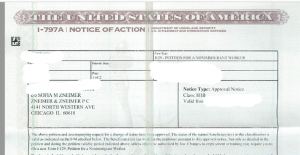The journey of foreign medical graduates to practice medicine in the United States embodies a challenging yet immensely rewarding pathway. From securing a visa to fulfilling residency requirements, FMGs navigate a web of regulatory and procedural hurdles, including dealing with ECFMG, USMLE, state licensing issues, and of course, immigration issues. In this landscape, understanding the intricacies of J waivers, H-1B visas, and the role of experienced immigration law firms like Zneimer & Zneimer becomes indispensable.
For many FMGs, the journey begins either with H-1B or with a J-1 visa. The J-1 visa comes with two years foreign residency requirements and ineligibility for H-1B visa or permanent residence until the two years foreign residency requirement is completed or unless the foreign medical graduate receives a J waiver. For those seeking to remain in the U.S., obtaining a J-1 waiver is crucial. This waiver allows FMGs to bypass the home residency requirement under certain conditions, such as serving in a medically underserved area. The complexity of these applications highlights the importance of having seasoned immigration attorneys to guide FMGs through the process. Our law firm is very experienced in all types of J waivers.
The H-1B visa serves as another mechanism for FMGs aspiring to practice in the U.S. but not all residency programs file H-1B petitions for their medical residents. Unlike the J-1, the H-1B does not inherently require a return to one’s home country after training. It permits FMGs to work in the U.S. for up to six years, offering a potential pathway to permanent residency. The annual cap on H-1B visas and the lottery system make it a competitive and uncertain process, except for those foreign physicians who work for cap-exempt entities. Expert legal guidance becomes invaluable in navigating this complex landscape and maximizing the chances of a successful application.
At the heart of the journey for many FMGs is the support and expertise of immigration law firms, among which Zneimer & Zneimer stands out for its dedication and success in assisting FMGs. Our clients stay with us from the start of their medical residency throughout the day they become citizens. With years of experience, Zneimer & Zneimer has developed a deep understanding of the unique challenges faced by FMGs and tailored strategies to overcome these obstacles. Whether it is strategizing for J-1 waivers, filing H-1B petitions, or navigating the green card process, Zneimer & Zneimer provides comprehensive support to FMGs at every step of their journey.
What sets Zneimer & Zneimer apart is not just its expertise in immigration law but its genuine commitment to the success and well-being of FMGs. Recognizing the critical role of FMGs in addressing healthcare shortages across the U.S., Zneimer & Zneimer takes pride in facilitating the integration of these highly skilled professionals into the U.S. healthcare system. The firm’s extensive experience, coupled with a personalized approach to each case, ensures that FMGs have the best possible representation and advice. Continue reading →
 Chicago Immigration Lawyer Blog
Chicago Immigration Lawyer Blog



